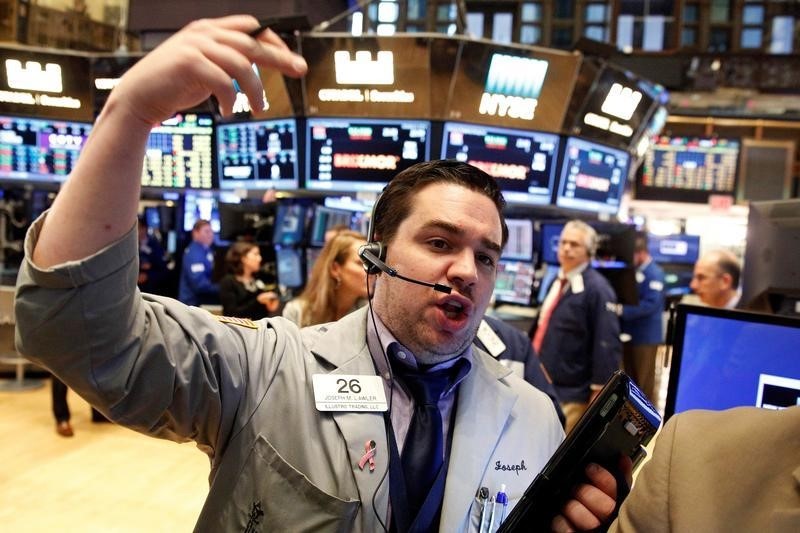By Geoffrey Smith
Investing.com -- The final presidential debate ended without a clear winner; Europe's economy lurches towards a double dip; Intel (NASDAQ:INTC) stock slumps after a badly-received earnings report and Vladimir Putin puts a floor under oil prices. Here's what you need to know in financial markets on Friday, October 23.
1. Biden holds off politer Trump in final debate
The final presidential debate came and went without visibly changing the course of the election campaign, although the watching nation and wider world was probably grateful that the ugly shouting match of the first debate wasn’t repeated.
Among the key moments of the evening, Democratic Party nominee Joe Biden acknowledged that he would “transition” away from oil and gas to renewable energies – a statement from which some fellow Democrats distanced themselves after the debate.
President Trump came under pressure for his handling of the pandemic (“he has no clear plan” for the coming winter, Biden said), his business interests in China and his immigration policies. The two traded accusations about the propriety of their personal finances.
2. Europe lurches toward double-dip
The European economy lurched towards a double-dip recession in October, according to the latest round of purchasing managers indexes from IHS Markit.
The preliminary Eurozone PMI fell below the 50 level that separates growth from contraction, sliding to 49.4 from 50.4 in September. That was a whisker above consensus forecasts for 49.3.
Most notable was the divergence between manufacturing, where the PMI rose to 54.4 from 53.7, and services, where it fell to 46.2 from 48.0. Services have been the first thing to be hit by a creeping clampdown on non-essential social contact across Europe, which saw France extend a 9 PM curfew to three-quarters of its population on Thursday.
France, Germany and Spain have all posted record high daily rates for new Covid-19 infections this week, while hospitalizations have also increased, although they remain well below the spring peak.
3. Stocks set to open higher on unchanged base case election outlook
U.S. stock markets are set to open mostly higher after the election debate allowed investors to stick to their central case scenario of a clear-cut election result and a Democratic clean sweep that allows for a big stimulus package in the new year.
By 6:30 AM ET (1030 GMT), Dow 30 futures were up 82 points, or 0.3%, while S&P 500 Futures were up 0.2% and NASDAQ Futures were down 0.1%.
Nasdaq futures were underperforming largely because of Intel (NASDAQ:INTC) stock, which slumped nearly 10% in premarket after disappointing results from the chipmaker after the closing bell on Thursday.
The day’s early releases are dominated by American Express (NYSE:AXP), Royal Caribbean (NYSE:RCL) Cruises and refiner Phillips 66 (NYSE:PSX).
4. Huawei's pain starts to show
The Trump administration’s pressure on Chinese telecoms giant Huawei is starting to become evident in the company’s numbers.
Huawei said its revenue growth fell to 3.7% on the year in the third quarter, down sharply from 27% a year earlier and an average rate of 21% over the last five years. However, the real squeeze on the company isn’t likely reflected in those numbers, as the administration only tightened restrictions on U.S. companies selling to the company in September. That move largely cut it off from its traditional chip suppliers.
Although the company didn’t break down its figures, the Financial Times cited analysts who estimated that its smartphone sales fell 18% on the year, their first ever year-on-year decline.
5. Putin props up oil
Russian President Vladimir Putin dropped the clearest hint yet that he may be willing to push back a scheduled increase in oil output at the start of next year.
Speculation that the ‘OPEC+’ bloc, which includes Russia, could defer a production increase due to weak global demand has supported prices on and off throughout the week, but weakened on Monday after neither the Russian nor Saudi ministers committed clearly to such a step.
“We think there is no need to change anything now,” Putin said Thursday in his address to the Kremlin-backed Valdai Club. Yet “we don’t rule out that we may keep the current restrictions on output, that we don’t lift them as soon as we had planned earlier.”
U.S. crude futures were up 0.5% at $40.86 a barrel by 6:30 AM ET, on course to end the week roughly where they started it. Brent futures were up 0.7% at $42.75.
Baker Hughes' drilling rig data round off the week at 1 PM ET. The number of active oil rigs in the U.S. rose above 200 to a four-month high last week.
